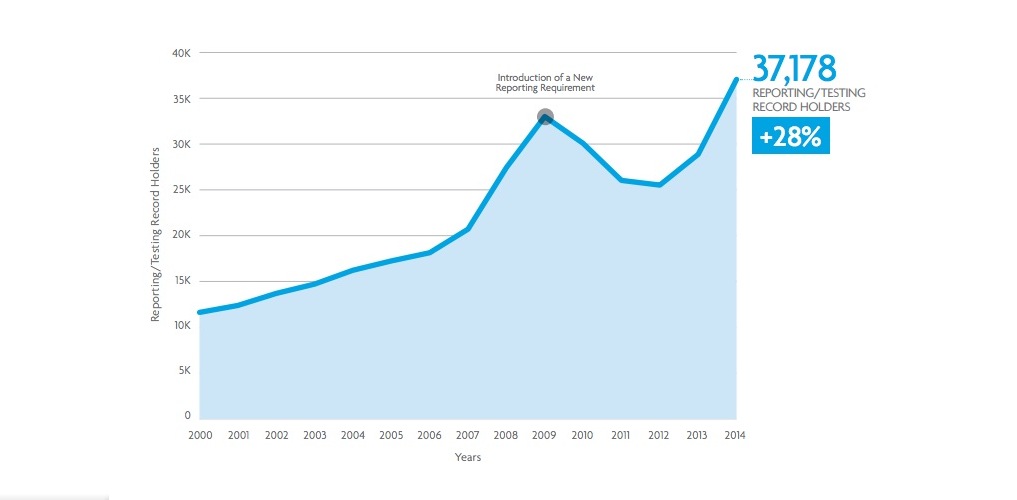The National Council of Architectural Registration Boards (NCARB) released the 2015 edition of NCARB by the Numbers, a yearly report about the path to licensure. The redesigned publication is available for free download at www.ncarb.org/NBTN.
The latest NCARB data reveals a number of positive trends relating to both the future of the architectural community and NCARB’s regulatory and licensing efforts.
“The architect profession is healthy and growing,” said NCARB CEO Michael Armstrong. “The report’s findings also help validate the efforts of NCARB and its licensing board members to open doors of opportunity for qualified people in the architecture profession without sacrificing the rigor needed to ensure public health, safety, and welfare.”
The report’s findings indicate progress in several key areas:
• A record high of 37,178 aspiring architects either reporting hours through the Intern Development Program (IDP) or testing for the Architect Registration Examination (ARE).
• 107,581 licensed architects reported by the 54 U.S. licensing boards, a 3% increase since 2011.
• The average age of an architect upon initial licensure fell to 33.3 in 2014, shaving off 2.7 years since 2008.
• Racial and ethnic minorities made up 41% of the aspiring architect talent pool in 2014, compared to 22% in 2007.
• Women made up 38% of aspiring architects who completed the IDP in 2014, compared to 25% in 2000.
• Women also accounted for 35% of candidates who completed the ARE last year, a percentage that has nearly doubled since 2000.
Program changes, as well as NCARB’s renewed focus on providing guidance and clear communications to emerging professionals, have played a big part in improved performance metrics, said NCARB 2014-15 President Dale McKinney, FAIA, NCARB. “NCARB’s 2014 data finds that the growing number of female aspiring architects, combined with those from racial and ethnic minority groups, indicates the future architect workforce should be more diverse.”
Download the full report at: www.ncarb.org/NBTN
Related Stories
| Dec 5, 2013
Translating design intent from across the globe
I recently attended the Bentley User Conference in Vejle, Denmark. I attended the event primarily to get a sense for the challenges our Danish counterparts are experiencing in project delivery and digital communication. One story I heard was from a BIM manager with Henning Larsen Architects in Denmark, who told me about a project she’d recently completed overseas in the Middle East. She outlined two distinct challenges and offered some interesting solutions to those challenges.
| Dec 3, 2013
‘BIM for all’ platform pays off for contractor
Construction giant JE Dunn is saving millions in cost avoidances by implementing a custom, cloud-based BIM/VDC collaboration platform.
| Dec 3, 2013
Historic Daytona International Speedway undergoing $400 million facelift
The Daytona International Speedway is zooming ahead on the largest renovation in the Florida venue’s 54-year history. Improvements include five redesigned guest entrances, an extended grandstand with 101,000 new seats, and more than 60 new trackside suites for corporate entertaining.
| Dec 3, 2013
Creating a healthcare capital project plan: The truth behind the numbers
When setting up a capital project plan, it's one thing to have the data, but quite another to have the knowledge of the process.
| Dec 3, 2013
Architects urge government to reform design-build contracting process
Current federal contracting laws are discouraging talented architects from competing for federal contracts, depriving government and, by inference, taxpayers of the best design expertise available, according to AIA testimony presented today on Capitol Hill.
| Dec 3, 2013
Construction spending hits four-year peak after rare spike in public outlays
An unusual surge in public construction in October pushed total construction spending to its highest level since May 2009 despite a dip in both private residential and nonresidential activity.
| Nov 27, 2013
BIG's 'oil and vinegar' design wins competition for the Museum of the Human Body [slideshow]
The winning submission by Bjarke Ingels Group (BIG) and A+ Architecture mixes urban pavement and parkland in a flowing, organic plan, like oil and vinegar, explains Bjarke Ingels.
| Nov 27, 2013
Retail renaissance: What's next?
The retail construction category, long in the doldrums, is roaring back to life. Send us your comments and projects as we prepare coverage for this exciting sector.
| Nov 27, 2013
Pediatric hospitals improve care with flexible, age-sensitive design
Pediatric hospitals face many of the same concerns as their adult counterparts. Inpatient bed demand is declining, outpatient visits are soaring, and there is a higher level of focus on prevention and reduced readmissions.
| Nov 27, 2013
Exclusive survey: Revenues increased at nearly half of AEC firms in 2013
Forty-six percent of the respondents to an exclusive BD+C survey of AEC professionals reported that revenues had increased this year compared to 2012, with another 24.2% saying cash flow had stayed the same.

















